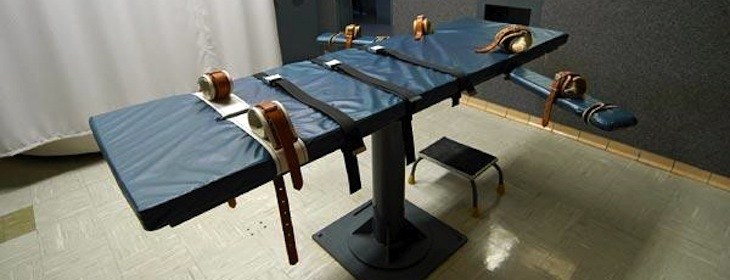Arkansas Supreme Court grants stays for two inmates set to be executed Monday (Updated)
by April 17, 2017 4:22 pm 435 views

Editor’s note: Story updated with comment from an attorney for the inmates.
––––––––––––––––
There will be no death penalty by lethal injection on Monday (April 17) unless the U.S. Supreme Court steps in. A stay has been granted by the Arkansas Supreme Court for the executions of inmates Don Davis and Bruce Ward.
Chief Justice Dan Kemp and Justices Courtney Goodson, Jospehine Hart, and Robin Wynne were in the majority opinion. Justices Karen Baker, Shawn Womack and Rhonda Wood were the three dissenters. In a lengthy dissent, Justice Womack issued a pointed conclusion about the decision to stay the executions.
“On a final note, and of no less importance, the majority, in a 4-3 decision, is granting relief to the two individuals who were convicted of murdering Rebecca Lynn Doss and Jane T. Daniel. The petitioners had their day in court, the jury spoke, and decades of appeals have occurred. The families are entitled to closure and finality of the law. It is inconceivable that this court, with the facts and the law well established, stays these executions over speculation that the Supreme Court might change the law. This court has a duty to apply the laws of Arkansas as they exist today. … Today, justice has been denied by the majority,”
A statement from the office of Arkansas Attorney General Leslie Rutledge said she is “considering options as to how to proceed.” Later in the day Rutledge tweeted that she planned to appeal the decision to the U.S. Supreme Court “this evening.”
UPDATE: Rutledge asked the U.S. Supreme Court to vacate the Arkansas Supreme Court’s stay of execution for Don Davis, but declined to request for similar action in Bruce Ward’s case. Ward’s case had been considered twice by the state’s high court and Rutledge suggested additional factors might come into play with the request.
Gov. Asa Hutchinson on March 6 set execution dates two at a time over an 11-day period starting April 17 and ending April 27.
• April 17: Don Davis, Bruce Ward;
• April 20: Stacey Johnson, Ledelle Lee;
• April 24: Marcel Williams, Jack Jones; and
• April 27: Jason McGehee, Kenneth Williams.
However, the State Parole Board on April 4 recommended the governor grant clemency to one of the condemned, Jason McGehee. On April 6, U.S. District Court Judge D. Price Marshall ruled in federal court that there must be at least a 30-day period before the Parole Board makes that recommendation. That would place McGehee’s execution past April 30, when the state’s supply of midazolam, one of three drugs used in its executions, expires.
Monday’s decision by the Arkansas Supreme Court was part of several legal actions that were possible related to the planned executions.
Scott Braden, assistant federal defender with the Arkansas Federal Defender’s Office, and an attorney representing the inmates, issued this statement: “There will be no executions tonight. We are deeply grateful that the Arkansas Supreme Court has issued stays of execution for Bruce Ward and Don Davis on the basis of proceedings commenced in light of the U.S. Supreme Court’s pending case, McWilliams v. Dunn, which presents the precise question also at issue in Mr. Ward’s and Mr. Davis’s cases.
“The question in McWilliams is whether the Court’s 1985 ruling in Ake v. Oklahoma clearly established that an indigent defendant is entitled to meaningful assistance from an expert who is independent of the prosecution. As the Brief for the Petitioner in McWilliams states: ‘[t]he prosecution and defense can no more share the same expert than they can share the same lawyer.’ The Court will hold oral argument in McWilliams on April 24.
“Like Mr. McWilliams, Mr. Ward and Mr. Davis were denied access to independent mental health experts, even though they clearly demonstrated that mental health issues would be significant factors at their trials. Mr. Ward has severe and life-long schizophrenia, breaks with reality, and delusions, such as seeing demon dogs at the foot of his bed since childhood. Mr. Davis has organic brain damage, intellectual disability, a history of head injuries, fetal alcohol syndrome, and other severe mental health conditions.
“Both Mr. Ward and Mr. Davis were denied independent mental health experts to help their defense attorneys investigate, understand, and present these critical mental health issues to the jury. The Arkansas Supreme Court recognized that executing either man, before the Court answers this question for Mr. McWilliams, would be profoundly arbitrary and unjust.”
